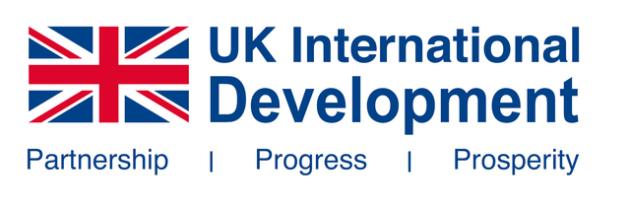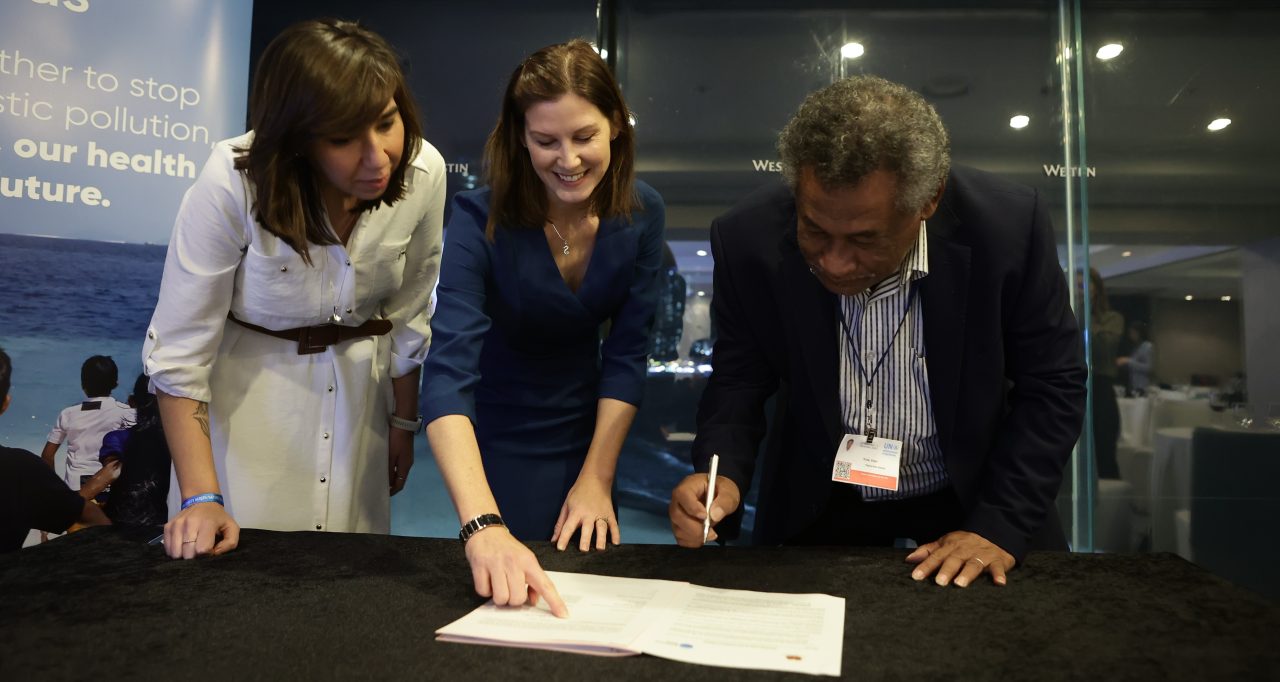- Common Seas has announced partnerships with Guinea-Bissau, Grenada, Papua New Guinea, Tuvalu and Saint Lucia to take bold action on plastic pollution
- Common Seas will provide technical support to co-develop and enhance national policy strategies that have the potential to reduce plastic pollution by 75% over the next 10 years
- The programme is funded with £1.08 million from the UK’s Sustainable Blue Economies Programme to support national action on plastic pollution in Small Island Developing States (SIDS)
- The agreements were made at an event alongside the INC-5 negotiations toward a Global Plastics treaty
- The event was co-hosted by Common Seas and The Government of The Gambia. Small coastal countries and partners met to explore their leadership and requirements from the Treaty
Grenada, Guinea-Bissau, Papua New Guinea, Tuvalu and Saint Lucia have confirmed agreements to work with Common Seas to develop and enhance national strategies to radically reduce plastic pollution in their countries. The agreements were formalised at an event alongside the fifth round of negotiations for a Global Plastics Treaty in Busan.

The event, co-hosted by Common Seas and the Government of The Gambia, celebrated the growing leadership of these countries in addressing plastic pollution. It provided a vital space for delegates and supportive partners to explore their insights on tackling plastic pollution, along with their priority needs from the future treaty.
Over the next year, Common Seas will partner with the five countries to create comprehensive roadmaps to radically reduce plastic pollution in their countries, contributing to a healthier ocean and a healthy future. Ahead of obligations set to emerge from the Global Plastics Treaty, these countries are already committing to translate future global rules into action to end plastic pollution on their shores and beyond.
Speaking at the event, Dr Charlotte Davies, Managing Director of Common Seas, said: “Island States and large ocean states are disproportionately impacted by plastic pollution, and rely heavily on healthy oceans for their economies and wellbeing. This makes it of utmost importance that their governments have tailored, actionable plans in place to tackle plastic pollution on their shores.
“We are delighted to have formalised our partnerships with Guinea-Bissau, Grenada, Papua New Guinea, Tuvalu, and Saint Lucia and look forward to working with their governments to develop and enhance strategies to stop plastic pollution in their countries. As delegates grow close to agreeing a Global Plastics Treaty, these frontrunner countries are joining a rapidly growing community of small coastal countries that are leading the way on plastic pollution.”
The programme is funded by UK International Development through the UK government’s Sustainable Blue Economies (SBE) Programme, which aims to enhance the resilience of Small Island Developing States (SIDS).
UK’s SIDS Envoy, Rebecca Fabrizi said “Plastic pollution remains a threat to SIDS’ ability to build and maintain sustainable thriving ocean-based economies. Supporting SIDS in developing policies and strategies to minimise this threat will be crucial to protecting marine life and protecting the health and livelihoods of their citizens.
“The UK continues to champion work in this regard as a founding member of the High Ambition Coalition to End Plastic Pollution. With the support from the Sustainable Blue Economies Programme, Common Seas will work with SIDS to find solutions to reducing plastics pollution, helping them build sustainable futures.”
Common Seas has already developed National Plans to end plastic pollution with Barbados and The Gambia. Ultimately, they aim to support partner governments to reduce ocean plastic in their countries by 75% over the course of the next ten years.
Speaking at the event about The Gambia’s experience of developing their voluntary National Plan, Dr Dawda Badgie, Executive Director of the National Environment Agency, said: “Whether you have a bigger economy or a smaller one, plastic pollution affects everyone. Plastic pollution doesn’t know boundaries, it doesn’t require a visa to enter the UK or America. Wherever there is plastic pollution in one country, you know it can turn up in another country. The world is a global village.”
“If you want to walk fast, walk alone. If you want to walk far, walk together. That is what we’ve seen working with Common Seas, and now I encourage countries to work together for a better future. This is for our own betterment, but we also owe it to our future generations.”
The frontline of plastic pollution
Large ocean states and island states are vital stakeholders in the movement to end plastic pollution. SIDS are custodians of nearly a third of the world’s ocean, averaging 96% ocean by area. Their marine environments are not only a vital source of biodiversity, but they are also lifelines for their economies.
However, with 11 million metric tonnes of plastic entering our oceans every year, these countries are on the frontlines of the plastics crisis. Limited access to waste management and large volumes of waste washing up on their shores make plastic pollution a major threat to their environment, public health and economies.
About National Plans on plastic pollution
National Plans are a vital element of multilateral environmental agreements (MEAs) that empower member states to translate global rules into tailored national action. By presenting a baseline assessment of plastic pollution and its sources, modelling the long-term consequences of inaction, and demonstrating the impact of recommended policies, they provide governments with a roadmap they can implement to significantly reduce plastic pollution.
When legislated effectively, National Plans have the power to keep countries on track and accountable in fulfilling the obligations of the agreement. Agreements such as the Montreal Protocol have demonstrated their potential, driving globally coordinated action to reverse ozone depletion. It is highly likely that member states will be required to develop National Plans under the Global Plastics Treaty.
As part of their work on the Treaty, Common Seas will convene stakeholders to form and scale a collective approach to National Plan development that is tailored to the unique challenges and needs of small coastal economies in key regions, while complying with Global Plastics Treaty requirements.
For the Treaty to achieve its mandate to end plastic pollution, it is vital that effective National Plans are included as a critical implementation vehicle, complementing global rules, driving coordinated national action, and supporting the requirements of small coastal countries and SIDS in implementing their obligations.
The work of Common Seas and partners demonstrates that small coastal countries are ready to take radical action to tackle plastic pollution. Now, they need negotiators to agree on an ambitious Plastics Treaty that will support them in doing so, whilst driving a just transition to a healthy future, freed from plastic.
Saint Lucia partnership
The Government of Saint Lucia is partnering with Common Seas to support the existing Marine Litter Management Action Plan (ML-MAP) using the Plastic Drawdown tool to address plastic pollution in Saint Lucia.
Funding from the UK’s Sustainable Blue Economies Programme
Supported by funding from the UK Government through UK International Development, Common Seas will partner with five Small Island Developing States (SIDS) to develop National Action Plans to tackle plastic pollution.
This critical funding will allow us to develop and scale an approach tailored to the unique challenges and needs of SIDS, which are disproportionately affected by the plastic crisis. The project will support partner governments to radically reduce ocean plastic in their countries over the course of ten years and contribute to a sustainable blue economy.
About the Sustainable Blue Economies Programme
The Sustainable Blue Economies (SBE) programme aims to enhance the resilience of ODA-eligible Small Island Developing States (SIDS) and their economies to the impacts of climate change and economic shocks, including through better ocean management, poverty reduction/improved livelihoods and greater use of nature-based solutions (NbS).
The six-year programme, announced by the UK Prime Minister at CHOGM in July 2022 is a commitment of the UK Government to support developing countries in protecting their marine environment and reducing poverty.

